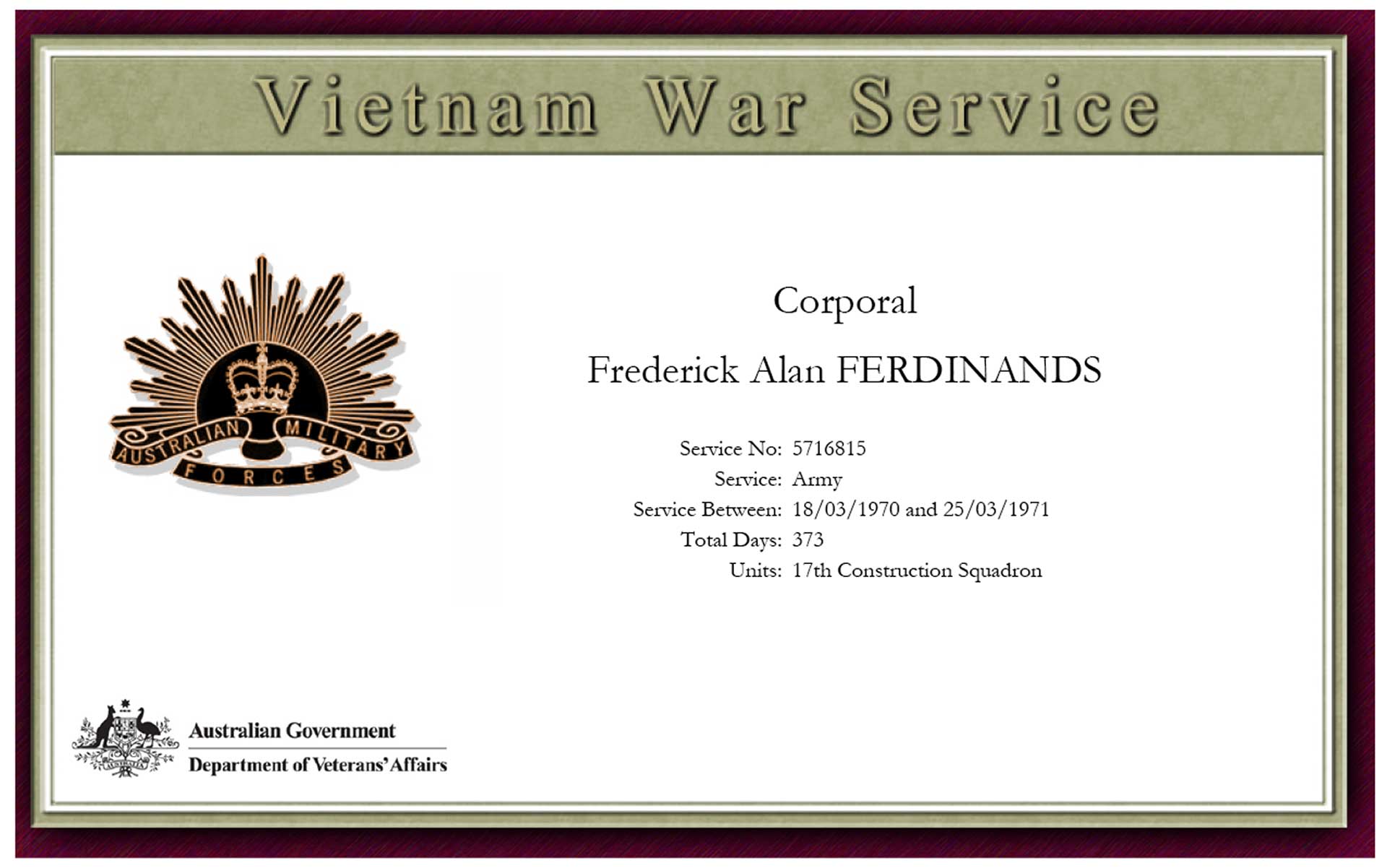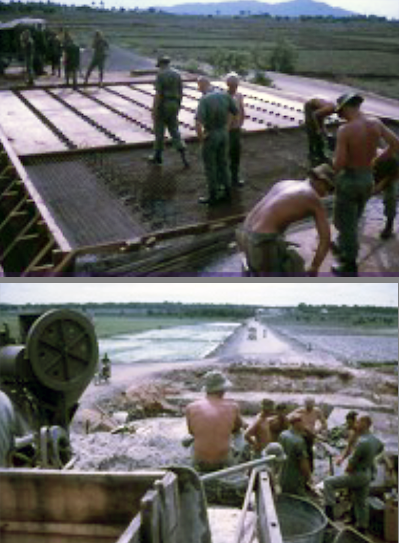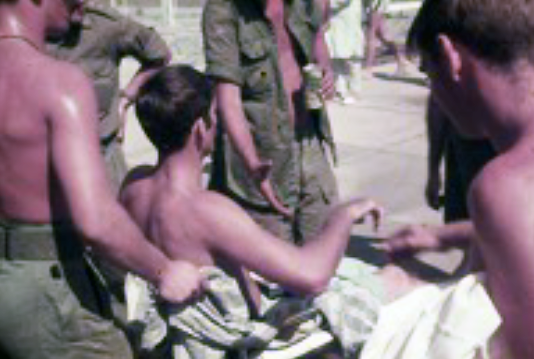 PHASE 1. From a civilian to a soldier, a life changing experience.
PHASE 1. From a civilian to a soldier, a life changing experience.
My Vietnam story started a couple of months before my call-up for National Service. Two of my good friends from the YCW were in the call-up before mine so I was prewarned as to many of the dos and don’ts of the green machine, (don’t make eye contact, keep your mouth shut, etc). The best piece of advice was to wear warm clothes when travelling to the recruit course at Puckapunyal Victoria.
Precall-up also included our initial medical; I found it amusing to watch the antics of some of my peers doing their best to prove medically unfit for service, they were late, appeared to have had a night on the booze, untidy and very uncooperative, the staff’s reaction to these phoneys was just as entertaining.
We left Perth on the 9 July 1969, I remember someone saying it was 65oF (18oC) I felt a little ridiculous being rugged up but very thankful when we landed at Seymour airport Victoria. We were left standing on the tarmac waiting for our bags to be unloaded and for the transport to the camp. The wind chill factor must have taken the temperature below 0oC. Some of the guys were turning blue with just a short sleeve shirt; I was shivering in my singlet, long sleeve shirt, vest and jacket. A cranky old man yelled at us “you lot, get over here and pickup your bags”, no one moved, “are you bunch of West Australians hard of hearing, get over here and pickup your bags, still no movement. “You” pointing to one of the shivering individual, “don’t just stand there you @#$%&!” . . . . in a quiet shaky voice while picking up a bag, “this is mine over here sir”, the little old man snapped back, “don’t call me sir, I’m a sergeant”. We had watched the unloading and gone to our bags many looking for something warm to put on, it was bloody freezing. What an introduction to this strange new world.
The ten week recruit course at Puckapunyal was a total life changer. The colder climate and outdoor activities did us West Australians no favours, most of us struggled with bronchitis. On the morning runs Victorians went by to the sound of sandshoes in step, us West Australians went by to a chorus of coughing.
From Victoria my training took me to Sydney at the School of Military Engineering (SME). This was the place for me it was all hands-on; bridge building, water transport and crossings, all types of tools and machines, for a military perspective, mine warfare, field defences, booby traps, tunnel warfare, building field machines, explosives and gas warfare. After this training we were known as Sappers, proud members of the Royal Australian Engineers (RAE), we had become soldiers, team players, mates whatever you want to call it. To illustrate the change that had taken place, we left home as individuals, on completion of the training the whole course of 260 Sappers gathered in the boozer (no staff involved), single men on one side, married and engaged to the other. It was unanimously agreed that all the single men would volunteer for Vietnam to give our other mates a chance of staying home in Australia.
Our next stop was a kind of limbo, we moved into holding wing before being posted to our units. The duty sergeant with his clipboard would visit each morning handing out odd jobs for the day; guard duty, area beautification (gardening and picking up rubbish) mess duty, maintenance jobs around the barracks, etc. During that time I had a month’s leave with family in Perth and three weeks jungle training at Canungra Queensland.
They gave me one week pre embarkation leave with family and friends back home in Perth before my posting to Vietnam. The last person to say goodbye to me at Perth Airport after my pre embarkation leave was my eight year old brother Rick, he was waiting for me at the departure gate, teary-eyed he gave me a big hug and said “get plenty of bullets and hide”.
On the 18th March 1970 we left RAAF Base Richmond for my trip to Vietnam. At Singapore airport we were escorted from the plane between two rows of heavily armed (police/military?) to an empty room on the first floor of a building. Standing room only, no food or drink, couldn’t see out of a windows not even access to a toilet, some of the guys dropped around our legs searching for a comfortable spot on the floor. I suppose we had to be off the plane while refuelling, and as we were an active military force we had to be contained. I was happy to be back on board in a comfortable seat to continue the journey. From Saigon Airport we boarded an American troop transport plane for the final leg of our trip to Nui Dat.
PHASE 2. Vietnam, another life changing experience.
During my twelve months in Vietnam I was assigned to a range of projects and tasks too many to document, so many experiences unique to that time and place. We worked 24/7, the only free time at Nui Dat was Sunday afternoon unless they found something for us to do.
My unit 17 Construction Squadron provided both civil and military support to the Vietnamese people and the Australian Task Force; infantry is a Sapper’s secondary role.
A few extracts from Australian Army Commanders’ monthly Diaries (Vietnam)
These records are housed in the Australian War Memorial Archives.
File 57 Operations, page 23
17 Construction Squadron and 5 RAR continue to conduct joint infantry patrols close to the ATF base.
Land Clearing. During this period the team located and destroyed 62 bunkers and the D8’s had detonated six M16 mines.
“The jungle was cleared to deny the enemy access to the area; it also helped the local Vietnamese people by opening up the area for logging and farming. My five weeks at Land Clearing was relatively free of incidents except for a rocket being fired into our camp destroying our near new welder (KVA, VW motor).”

File 63 Operations, page 92
17 Construction Squadron has continued to provide protection parties for the Integrated Civic Action Programme (ICAP).
In July a protection party of 1 Officer and 30 was deployed to An Ngai.
“After a day in the sun pouring concrete at a bridge site, I can remember  returning to Nui Dat. We assembled with the rest of 9Tp, GPMG M60s, radios, rifles and webbing then being trucked out to a village, an infantry task to provide all round protection overnight for the ICAP unit.”
returning to Nui Dat. We assembled with the rest of 9Tp, GPMG M60s, radios, rifles and webbing then being trucked out to a village, an infantry task to provide all round protection overnight for the ICAP unit.”
“Bridge construction involved removing the single lane bridge built by the French and replacing it with two traffic lanes and a footpath. At one of the sites a local had built his shanty house out of odd sheet metal, a 100m from the bridge. We use explosives to break up the existing concrete structure, which also blew his house away. After the initial shock he was able to find a smile, he was compensated with 12 bags of cement and 20 sheets of corrugated iron. He reinstated the house with the old material, sold the cement and sheets of iron and bought a water buffalo.”
File 69 Operations, page 77
Significant Activities. 17 Construction Squadron featured in three significant events during the month. Squadron members at Bridge 5 took a prisoner who, on interrogation, provided information on enemy locations and activities, especially regard to D445 a Viet Cong Battalion in our area, The detainee was located on a sandy track, acting in a suspicious manner. He was taken to Nui Dat for interrogation, but later released.
The most significant event was wounding of three of the four member well boring team. This occurred when a Vietnamese youth threw a grenade into the group as they were finishing lunch.
“This photo taken at Nui Dat; a Sapper from the well boring team before being  medivaced home.
medivaced home.
His story continued; When able to walk on crutches he went with his wife to join his local RSL, sadly someone said to him, ‘go down those stairs and through the door on the left, when you have been to a real war come back and you can join’.”
As a construction squadron our main task was to improve the lives of the local Vietnamese people, their safety, wellbeing and infrastructure.
“Baria Hospital, just one of the civil aid projects, was an ideal place for us to make  modifications not because it had war damage but because of its abject poverty and inhumane conditions. The only water came from a bore with a squeaky hand pump on a small concrete slab between the buildings, I remember seeing a young boy who had burns down one side of his body, picking off scabs and allowing the muck to run down to the slab, meanwhile other people came bare-footed and stood on the slab to access the water. There were no bathrooms or toilets, I remember seeing people come out of a building, drop their pants and relieve themselves. There was no food preparation area, friends and family would cook outside the buildings, a little old French nun provided a little food for those patients who had no one.
modifications not because it had war damage but because of its abject poverty and inhumane conditions. The only water came from a bore with a squeaky hand pump on a small concrete slab between the buildings, I remember seeing a young boy who had burns down one side of his body, picking off scabs and allowing the muck to run down to the slab, meanwhile other people came bare-footed and stood on the slab to access the water. There were no bathrooms or toilets, I remember seeing people come out of a building, drop their pants and relieve themselves. There was no food preparation area, friends and family would cook outside the buildings, a little old French nun provided a little food for those patients who had no one.
The operating room only had fly screen on the window, as we were building the
towers for the water tanks we could watch the Bac si (Doctor) at work.
Every morning the young boys would meet us at the hospital, first thing they would say “got any cigarettes” my answer was always “no I don’t smoke”, they would reply by calling me a lazy bastard or words to that effect. They’d spend the day with us chatting and being a likeable nuisance, we would share our lunch with them.
We provided running water to the hospital, built a kitchen and a toilet block with a septic tank and piped the overflow to the river.”
PHASE 3. From a soldier to a civilian, I’m struggling to find the words.
Without a doubt my return from Vietnam had been my greatest life changing experience, I was not prepared for the negative response from the Australian public especially my family and friends. I had hoped to return to the life I had in Perth two years earlier but that was not possible.
I just didn’t fit back into any of my past comfortable life, my circle of friends had moved on with their lives, some married, a couple had left Perth others had changed course with new friends and activities. I was made to feel very uncomfortable when I went back to resume the job I had before being called up.
My day job had been taken by a very angry person who said, “You’re not kicking me out on the street, I’ve got a wife and three kids to support”, turned his back on me and walked away, the boss was not supportive, he said “you sort it out boys”, what was I to do.
From there I went to see a so called friend, the one I had given my contract work to, he started crying saying “I’m getting married and need the money”, his dad chimed in saying “you better leave now”, again what was I to do. I left feeling sad, I thought he was my friend, I was expecting a smile and a welcome home mate and thanks for thinking of me with regard to the contract work. What a kick in the guts, again I was made to feel like the villain.
My church which should have been my peaceful place had been overhauled by Vatican 2, (I had not been there for the transition) during mass there were groups of people singing, playing guitars and other instruments, people chatting and shaking hands with everyone around, This was not the peaceful quiet place I knew, it reminded me of a concert.
A few weeks after discharge as a result of family tension I left Perth emotionally drained. I drove the first 900 miles on petrol and pies, had three hours sleep in my car then completed the trip to Adelaide. From there I went to Melbourne then on to Brisbane where I settled down. The high point of my trip was meeting my Vietnam mates.
The two year National Service including the twelve months in Vietnam had been intense; I was out of my comfort zone, away from loved ones and the care free life of a young Australian. We did our best to support and improve the lives of the Vietnamese people. We were able to face these challenges because we had young Australian (mates) by our side for support. I wear my medals with pride having served my country. As for challenges after Vietnam, I was on my own, had to start a new life in Queensland.
Memories of the way National Service impacted my life after returning from Vietnam, the good the bad and the ugly; over time the balance has tipped in favour of making me happy with my path in life, so what Oscar Wilde said must be true ‘with age comes wisdom’.
